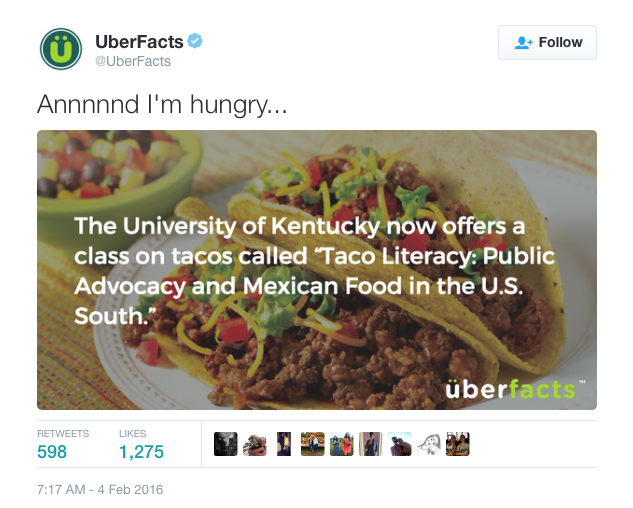‘Taco class’ is about more than just tacos
February 11, 2016
The writing, rhetoric and digital studies course, “Taco Literacy: Public Advocacy and Mexican Food in the U.S. South,” has garnered attention, excitement and misconception from such national outlets as Eater and Vice. A Fox News article on the class was headlined, “Now you can pay to take a college course on how to eat tacos.”
While there is a tasty research element to the course, Assistant Professor Steven Alvarez has only brought food from local markets for students to sample twice as of yet.
But despite initial judgements from the outside, history senior Ruth Gonzalez and animal science senior Doreeyda Caloca, two founders of the UK Latino Student Union, said it’s so much more.
The class is focused more on how local, homemade “Mexican food has found a niche in the South,” outside of commodified chains like Chipotle or Taco Bell, Caloca said.
Students are encouraged to explore “Mexington,” the area of town that houses a large Mexican population, as well as restaurants vending authentic Mexican cuisine.
“There’s kind of this backwards theme of trying to get back to the authentic food, and a lot of the small local restaurants are getting a lot more attention, like Tortillera y Tacquieria Ramirez got put on the map because of their burrito,” Caloca said.
“It really encompasses more about migration foodways and looking at the South through the prism of food,” Alvarez told Buzzfeed News.
Discussions and assignments on topics such as immigration reform, migrant workers and culture comprise the public advocacy component of the class.
”The U.S. and Mexico have had a strenuous relationship, so it’s like, ‘We like your food, but we don’t really like your people,’” Calcoa said.
Mexican food blew up in the South, especially around World War II, and with that came more evolution of traditional dishes. Essentially, that’s the heart of the course.
“It’s not a class about ‘how to eat a taco.’ It’s more of a class about how that taco came about, and the history behind it,” Gonzalez said.
































































































































































